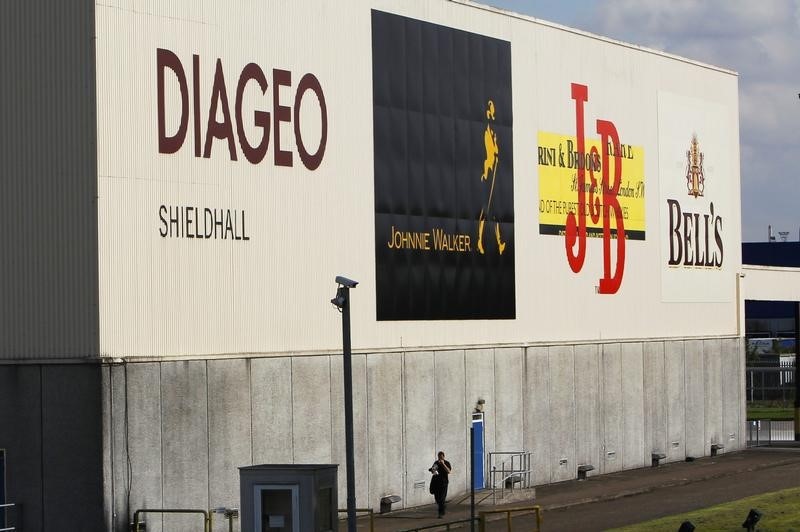By Muvija M and Martinne Geller
(Reuters) - Diageo Plc (L:DGE) is selling 19 lower-end spirits brands including Seagrams VO Canadian whisky and Goldschlager cinnamon schnapps to U.S.-based Sazerac for $550 million, as it focuses on its premium labels such as Johnnie Walker in the United States.
The divestiture is the latest move from the world's largest spirits company to trim its portfolio and concentrate more closely on its core business. In recent years, it has sold interests in wine, Red Stripe beer and the Gleneagles hotel and golf resort.
Diageo, also known for Smirnoff vodka and Guinness stout, said on Monday it would return the net proceeds of about 340 million pounds ($438 million) to shareholders through a share repurchase.
The sale, which also includes whisky brands such as Seagram's 83, Seagram's Five Star and Jamaican rum Myers's, will reduce Diageo's pre-exceptional earnings per share by 1.9 pence per share in the first full financial year after closing.
Yet it will improve growth in Diageo's U.S. spirits business by 40 to 50 basis points, its chief financial officer told Reuters, by shifting the business away from the low end of the market, where sales are falling as more drinkers choose premium labels.
"The value space has been in secular decline for a number of years, so we see the bigger growth opportunity and focus for our business in premium and above," CFO Kathryn Mikells said.
Berenberg analyst Javier Gonzalez Lastra said the brands Diageo is selling were seeing sales decline by as much as 10 percent a year.
Sky News reported https://news.sky.com/story/diageo-calls-time-on-goldschlager-in-1bn-sell-off-11383825 in May that the company was in talks to sell some U.S.-focused brands for an overall price tag of between $500 million and $1 billion.
But the deal struck with Sazerac does not include the large Seagram's 7 Crown American whiskey brand, Mikells noted. The company is keeping that brand, while selling the Canadian Seagram's whisky.
The North American region is the biggest market for premium drinks in the world, and accounts for a third of the British company's sales and nearly half its operating profit.
Aside from pruning its portfolio, Diageo has been expanding the reach and improving the marketing of premium, global brands like Johnnie Walker. It has also done a number of acquisitions, including last year's purchase of George Clooney's tequila Casamigos and this year's purchase of Belsazar vermouth.
Mikells said Diageo was "very happy" with its current portfolio, but noted that the company would look at it periodically over the long term.
Regarding the beer business, which has sometimes been touted by outsiders as a potential divestiture, Mikells said Diageo considered it "a core business," and its key brand Guinness a high-end name consistent with its focus on premium labels.
Asked if Diageo was interested in entering the cannabis market, Mikells said Diageo was watching it closely, but so far had not seen any impact to its business from legalization of marijuana in Canada or parts of the United States.
"It's very early days and I think there isn't really enough clear data to be certain exactly what, if any, impact it may have," she said.
HIGH END BOOM
U.S. liquor sales hit a record $26.2 billion in 2017, fueled by high-end brown spirits like bourbon, and a big thirst for tequila and vodka, the Distilled Spirits Council, an industry group, said in February.
Diageo, part of the UK's blue-chip index, said it expects the sale to close in early 2019 and to bring in a one-time gain of roughly 110 million pounds.
The company has also agreed to long-term supply contracts with Louisiana, U.S.-based Sazerac.
Sazerac, which traces its roots to the early 19th century, is an independent, family owned company in the United States, home to brands such as Buffalo Trace and Pappy Van Winkle bourbon.
Shares of Diageo were down about 0.7 percent at 2,726.5 pence at 1037 GMT, after trading in positive territory initially.
($1 = 0.7768 pounds)
